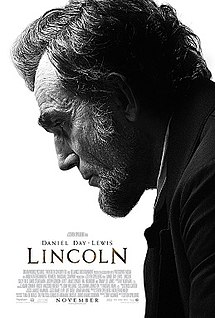 Steven Spielberg's Lincoln is, from a cursory vantage point, exactly what you would expect from sweeping period piece assembled by a superstar director, accomplished and prolific screen writer, impressive cast. In that regard it's like a brand name that you know will be good so you don't have to worry about being disappointed. However, what sets Lincoln apart are the nuances it brings to the screen. Not surprisingly, Daniel Day-Lewis is fantastic. He embodied Lincoln to the point where you forget your watching an actor at times. It was uncanny. Day-Lewis is a chameleon in all of his roles, so it was no surprise he was going to absolutely nail this one, but to see the performance is to watch art in motion. Sally Fields was a question mark for me going into this, but she did an excellent job as well. Tommy Lee Jones, playing his usual ornery character shows his softer side as well. Rounding out the rest of the cast, as a friend of mine put it, is a veritable who's who of "Oh, it's that guy!" You'll recognize most of the actors (yes, mostly men) in the film, and you'll spend the rest of the time trying to figure out if you'd know who they were if they weren't wearing those huge 19th century beards.
Steven Spielberg's Lincoln is, from a cursory vantage point, exactly what you would expect from sweeping period piece assembled by a superstar director, accomplished and prolific screen writer, impressive cast. In that regard it's like a brand name that you know will be good so you don't have to worry about being disappointed. However, what sets Lincoln apart are the nuances it brings to the screen. Not surprisingly, Daniel Day-Lewis is fantastic. He embodied Lincoln to the point where you forget your watching an actor at times. It was uncanny. Day-Lewis is a chameleon in all of his roles, so it was no surprise he was going to absolutely nail this one, but to see the performance is to watch art in motion. Sally Fields was a question mark for me going into this, but she did an excellent job as well. Tommy Lee Jones, playing his usual ornery character shows his softer side as well. Rounding out the rest of the cast, as a friend of mine put it, is a veritable who's who of "Oh, it's that guy!" You'll recognize most of the actors (yes, mostly men) in the film, and you'll spend the rest of the time trying to figure out if you'd know who they were if they weren't wearing those huge 19th century beards.
From a cultural perspective, this film comes out at a particularly appropriate moment in modern history and current events. It's probably partially coincidental, but as this is often the trend with films it's also more intentional. As I was watching it, I thought to myself, the title could have been Lincoln: Nothing’s Changed. The white, controlling male majority was so fearful
of losing their footing as such that any notion of rights for other groups was
considered a traitorous affair. In this narrative, freeing the
slaves was a heretical thought for many and sparked physical and verbal vitriol against those who opposed them. Screenwrite Tony Kushner did a masterful job using language to highlight how similar this argument is to issues surrounding gay marriage today
or as (literally) laughable as giving women the vote. Yes, we've evolved in many ways as a society - this film is about freeing black slaves and today we have a black president! However, it’s painful and pathetic to see that 150
years later as a society we have not evolved enough to understand that change is good. In that sense Lincoln is speaking to those political blowhards and often time bigots to beg them to see that being on the side of allowing civil rights to flourish is a GOOD THING.
The message of the film is “which side of history do you
want to be on?” Watching Lincoln in 2012
it’s so beyond obvious that abolishing slavery is the right thing to do. All the relatively small details like worrying
about the economic changes the south will face and the stress that the opposing
party has to deal with in this new social structure is pittance compared with
the moral obligation of freeing the slaves and the march towards
enlightenment. Let's hope that in 150 years (most
definitely less, here’s hoping) movies will be made about the struggle towards
equality for homosexuals (and women, unfortunately we’re still dealing with
that too) and audiences will be shocked to see something that they take so for granted was a hugely polarizing issue once upon a time.
No comments:
Post a Comment